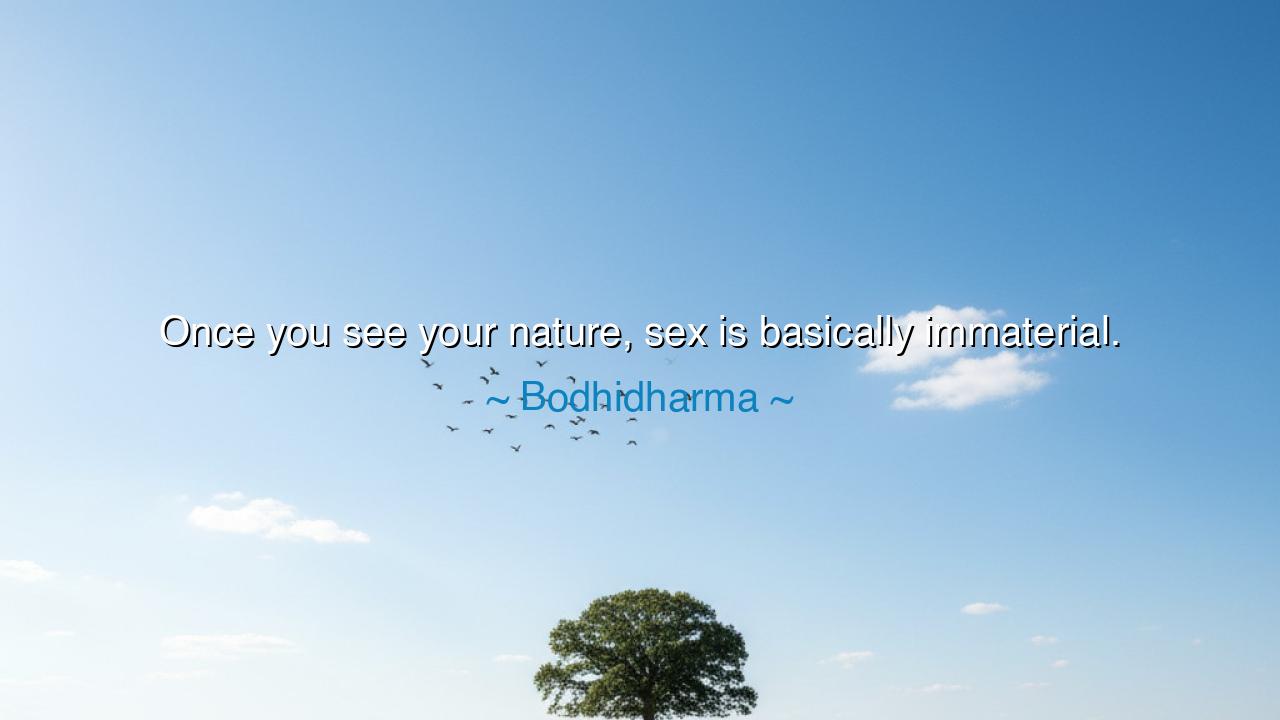
Once you see your nature, sex is basically immaterial.






Hear the ancient words of Bodhidharma, sage of the East and father of Zen, who declared: “Once you see your nature, sex is basically immaterial.” These words, though short, are as deep as the ocean and as sharp as the sword of awakening. They call us to look beyond the outer garment of identity and to behold the eternal essence that dwells within. For sex, like age, wealth, or title, belongs to the realm of the temporary, but nature belongs to the realm of the eternal.
To see one’s nature is to pierce the veil of illusion and recognize the true self, which is neither male nor female, neither high nor low, neither bound nor free. It is the clear mirror of awareness, the flame that cannot be consumed, the sky that cannot be divided. Bodhidharma teaches that once this truth is seen, all distinctions of sex and form lose their weight. They remain in the world of appearances, but they no longer define the being who has touched the eternal.
The ancients often struggled with this paradox. Kings and emperors built their power upon divisions—man and woman, slave and master, noble and common. Yet in the quiet chambers of wisdom, the sages taught otherwise. Consider Sappho of Lesbos, whose poetry transcended gender, for she sang of love in its essence, stripped of boundaries. Or recall Joan of Arc, who, though bound in a woman’s body, led armies with the fire of one who had touched something beyond earthly identity. These stories reveal what Bodhidharma proclaimed: that once you know your true nature, the vessel of flesh is but a passing detail.
There is also here a lesson about the illusions that bind us. Many cling fiercely to the definitions of sex and role, building their entire worth upon them. They ask, “Am I enough as man, as woman, as this or that?” But Bodhidharma whispers across the centuries: “Look deeper.” For when the mind sees only labels, it is chained. When it sees the nature beneath labels, it is free. True freedom is not to escape the body, but to no longer be enslaved by the categories imposed upon it.
Consider also the saints and mystics who lived in this truth. St. Francis of Assisi, though a man, spoke to the sun as brother and to the moon as sister, seeing beyond divisions into the unity of all creation. Likewise, in the Buddhist tradition, Guanyin, the bodhisattva of compassion, was depicted at times as male, at times as female, and at times as neither, for compassion is not bound by sex, but flows from the eternal nature within.
The meaning for us is profound: if you would live freely, do not define yourself only by what is visible. Remember that your nature is greater than your body, greater than your roles, greater even than your history. To see this is to find peace, for then you are not tossed about by comparisons, expectations, or divisions. You stand like the mountain, rooted in what cannot be shaken.
The lesson is clear: seek to know your nature. Sit in stillness. Look inward until you see the flame that precedes all names. Once you see it, you will not despise the body, nor deny it, but you will no longer be ruled by it. You will honor both man and woman as equal vessels of the same eternal spirit. And in your dealings with others, you will not be trapped by surface distinctions, but will meet them as fellow travelers of the same infinite road.
So let Bodhidharma’s words echo in your heart: “Once you see your nature, sex is basically immaterial.” Carry them as a reminder that you are more than the vessel you wear, more than the role you are assigned, more than the categories the world places upon you. In the end, what remains is the eternal flame of awareness. See it, honor it, and live from it—and you will walk the path of freedom.






AAdministratorAdministrator
Welcome, honored guests. Please leave a comment, we will respond soon